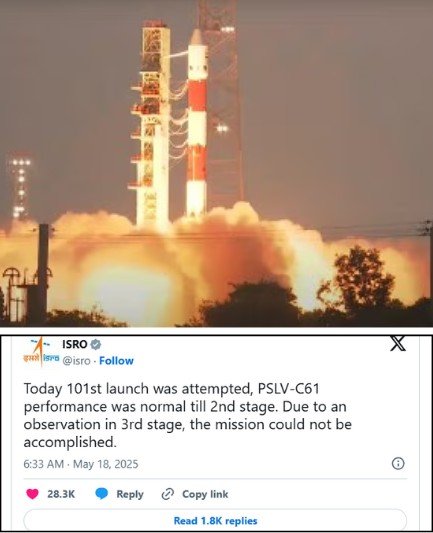In a rare setback for India’s celebrated space programme, the Indian Space Research Organisation (ISRO) on Sunday faced a mission failure as its 101st satellite launch, carrying the Earth Observation Satellite EOS-09, failed shortly after lift-off. The mission, conducted with the PSLV-C61 vehicle, was intended to place the advanced satellite in a Sun Synchronous Polar Orbit (SSPO), but was unable to complete the objective due to an anomaly detected during the third stage of flight.
Launched from the Satish Dhawan Space Centre in Sriharikota, the PSLV-C61 rocket initially performed flawlessly, completing its first and second stages successfully. However, an unexpected observation in the third stage halted the mission’s success. ISRO officials confirmed the issue shortly after the event, stating that the launch vehicle’s performance was nominal up to the second stage, but the mission had to be called off due to an anomaly that emerged thereafter. “We will come back after analysis,” said the ISRO Chairman in a brief statement, reflecting the space agency’s characteristic commitment to transparency and rigorous post-launch review.
The mission held special significance, not just for ISRO but for India’s strategic and scientific communities. EOS-09, an advanced Earth observation satellite, was equipped with C-band synthetic aperture radar capable of delivering high-resolution images irrespective of weather conditions or time of day. This technological edge would have greatly bolstered India’s capabilities in environmental monitoring, agriculture, forestry, disaster response, and even strategic military applications. The satellite was part of a larger constellation designed to provide India with real-time and all-weather Earth imaging capabilities.
Interestingly, this mission was also aligned with ISRO’s increasing focus on responsible space operations. EOS-09 was outfitted with deorbiting fuel—an effort to ensure that the satellite could be safely removed from orbit at the end of its operational life, thus contributing to global efforts toward reducing space debris.
This marked the 63rd flight of the PSLV (Polar Satellite Launch Vehicle) and the 27th using the PSLV-XL variant, known for its enhanced thrust and payload capacity. Until May 18, the PSLV had successfully executed 100 missions, earning ISRO a reputation for reliability and efficiency in space transportation. The PSLV’s consistent record over three decades has made it a preferred launch vehicle not only for Indian payloads but also for several foreign satellites.
Despite the setback, the mission reflects ISRO’s unrelenting pursuit of technological advancement and self-reliance. The failure is a reminder of the inherent challenges of space exploration, even as India continues to stride forward with its ambitious space programme. Earlier, noted scientist W Selvamurthy had praised the EOS-09 mission and the scientists behind it, underscoring its strategic importance for multiple sectors across India.
As ISRO initiates a comprehensive analysis of the failure, the agency remains focused on its pipeline of future missions, including Chandrayaan-3’s successor, human spaceflight under Gaganyaan, and more Earth and interplanetary observations. The experience gained from PSLV-C61 will undoubtedly inform future improvements and ensure that ISRO’s trajectory continues upward in the face of adversity.
#ISRO #EOS09 #PSLVC61 #IndiaSpaceMission #SpaceFailure #EarthObservation #SyntheticApertureRadar #IndianSpace #ISROMissionUpdate #SpaceDebris
This story has been rewritten and is published from a syndicated feed and auto web generated news web story.





